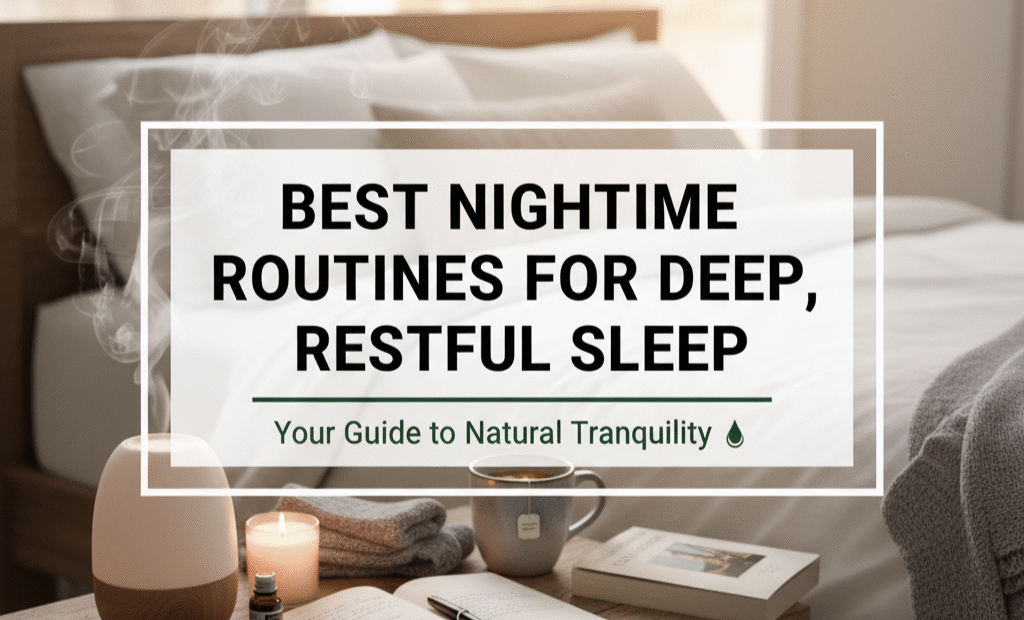Getting deep, restful sleep isn’t just about the number of hours you spend in bed. The quality of your sleep determines how refreshed, energized, and focused you feel the next day. One of the most powerful ways to improve sleep quality is by creating a consistent, science-backed nighttime routine. In this guide, we’ll explore the best habits, relaxation methods, and bedtime rituals to help you fall asleep faster and stay asleep longer.
Why Nighttime Routines Matter
Our bodies are governed by a natural internal clock called the circadian rhythm. This rhythm regulates sleep, wakefulness, hormone release, and even digestion. When you have an inconsistent nighttime schedule, your circadian rhythm becomes disrupted, making it harder to get quality sleep. A well-structured bedtime routine signals to your brain that it’s time to wind down, helping you transition into restful sleep naturally.
Step 1: Set a Consistent Sleep Schedule
One of the simplest yet most effective sleep strategies is going to bed and waking up at the same time every day—even on weekends. Consistency strengthens your circadian rhythm and makes it easier to fall asleep naturally.
- Choose a bedtime that allows for at least 7–9 hours of sleep.
- Avoid staying up late on weekends (known as “social jet lag”).
- Wake up at the same time daily, even if you slept poorly the night before.
Step 2: Create a Relaxing Pre-Sleep Routine
The hour before bed is critical for preparing your body and mind for deep rest. Build a routine that helps you disconnect from the day’s stress and signals your brain to slow down. Some effective practices include:
- Reading: A calming book (not on a backlit device) helps relax the mind.
- Light stretching or yoga: Gentle movement releases muscle tension.
- Meditation or breathing exercises: Slow breathing lowers stress hormones like cortisol.
- Warm shower or bath: A drop in body temperature afterward promotes drowsiness.
- Gratitude journaling: Writing down positive thoughts reduces anxiety before bed.
Step 3: Optimize Your Sleep Environment
Your bedroom should be a sanctuary for sleep. A few key changes can dramatically improve your ability to reach deep sleep:
- Temperature: Keep your room cool (60–67°F / 15–19°C is ideal).
- Lighting: Use blackout curtains or a sleep mask to block out light.
- Noise: Reduce disruptive sounds with earplugs or white noise machines.
- Mattress and pillows: Choose supportive, comfortable bedding.
- No electronics: Keep TVs, laptops, and phones out of the bedroom.
Step 4: Limit Blue Light Exposure Before Bed
Smartphones, tablets, and TVs emit blue light, which suppresses melatonin production and makes it harder to fall asleep. To protect your sleep:
- Avoid screens at least 1 hour before bed.
- If you must use devices, enable “night mode” or use blue light blocking glasses.
- Choose relaxing, screen-free activities like journaling or listening to calming music.
Step 5: Watch What You Eat and Drink
Diet has a direct impact on sleep quality. Eating large or heavy meals before bed can cause discomfort, while caffeine and alcohol disrupt sleep cycles. To sleep better:
- Avoid caffeine at least 6–8 hours before bedtime.
- Limit alcohol: While it may make you sleepy initially, it reduces REM sleep and causes nighttime awakenings.
- Eat a light snack: Foods rich in magnesium or tryptophan (like bananas, almonds, or warm milk) promote relaxation.
Step 6: Manage Stress Before Bed
Stress and anxiety are major causes of insomnia. By lowering stress before bed, you can ease your body into deep sleep:
- Practice mindfulness meditation: Focus on breathing and release racing thoughts.
- Progressive muscle relaxation: Tense and release each muscle group.
- Aromatherapy: Scents like lavender and chamomile are proven to support relaxation.
Step 7: Use Sleep-Friendly Activities
Instead of scrolling through social media or watching intense TV shows, choose activities that naturally make you sleepy:
- Reading fiction or self-improvement books.
- Listening to soothing music or nature sounds.
- Practicing gentle yoga stretches.
- Drinking herbal tea like chamomile or valerian root.
Bonus: The Power of a Digital Detox
Constant notifications, social media, and late-night emails overstimulate the brain. By setting clear digital boundaries in the evening, you give your brain the space it needs to relax and prepare for rest. Try putting your phone on airplane mode or charging it in another room at night.
FAQs About Nighttime Routines and Sleep
How long before bed should I start my routine?
A good rule is to begin your wind-down routine about 60 minutes before bedtime.
Can exercise before bed hurt my sleep?
Yes, intense exercise raises body temperature and adrenaline, making it harder to fall asleep. Instead, exercise earlier in the day or try gentle yoga stretches at night.
Do naps affect nighttime sleep?
Short naps (20–30 minutes) in the early afternoon usually don’t interfere, but long or late naps can make it harder to fall asleep at night.
Conclusion
The secret to deep, restful sleep isn’t found in expensive gadgets or sleeping pills—it’s about building a consistent nighttime routine that supports your body’s natural rhythms. By setting a regular schedule, limiting screen time, creating a calming pre-bed ritual, and optimizing your sleep environment, you can fall asleep faster and wake up feeling truly refreshed. Start with small changes tonight, and over time, you’ll notice your sleep quality—and your overall health—improving dramatically.
Remember: Better nights create better days. A healthy bedtime routine is one of the most powerful investments you can make in your physical and mental well-being.









